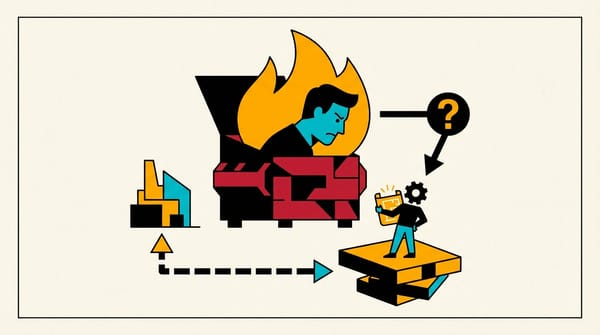The Dunning-Kruger Effect: How Not to Lose Motivation on the Path to Mastering Skills
Descubre el Efecto Dunning-Kruger y aprende a mantener la motivación en tu camino hacia la maestría. ¡No estás solo en este viaje!

Why It Is Important to Know About This
Because it constantly appears in our lives when we take on a new endeavor or start learning a new discipline. By understanding how our brain reacts to this and what it transmits from the unconscious to our consciousness, you can calmly begin your path, endure tough times, and reach the end. You'll understand that you're not alone and everyone faces the same brain reactions.
How It Looks on a Graph

The Beginning
We start with a blank slate. We have some expectations and an ocean of unknowns. The beginning is an emotionally calm and neutral territory. In this state, just do what you can. Don't look too far ahead and study the information layer by layer. Clear one layer and you'll see the next. At this stage, it's important not to try to encompass the infinite, but to focus on the small steps in front of you, calmly studying the material as it appears.
Peak of Stupidity
A spark, a storm, madness.
After a short and interesting work, you successfully take the first steps. Understanding comes, and you see patterns and connections. This happens quickly, and you think: "How much I know and how easy it turned out to be." This state is very pleasing to our brain; you feel satisfaction, and the brain generously rewards you with serotonin.
You think you've studied the subject deeply enough, and this creates a false sense of confidence.
I decided to master programming and data analysis to enhance my resume as a product manager. Initially, I mastered the basics, completely finished a Python course for beginners with a score of 2231 points, which corresponds to about 446 tasks. I was full of enthusiasm, thinking I had almost mastered this new field.
The same thing happened when I started learning Spanish. At first, everything came easily to me — I quickly mastered basic phrases and felt confident.
Valley of Despair
Then you notice — the tasks get more complicated, knowledge is lacking. You realize that knowledge is a horizon (an imaginary line) that recedes as you approach it. This realization sneaks up on you and hits you over the head with a shovel. Serotonin and dopamine leave you. You feel like doing nothing more.
This is normal. Everyone goes through this. Don't worry.
With programming, I fell into the valley of despair when I encountered more complex concepts like matrices, algorithms, and data structures. I started doubting my abilities, my learning pace slowed down significantly, and a constant inner voice began telling me that this wasn't for me and that I should quit.
In learning Spanish, I lost all motivation when I encountered the vast number of verb forms. For example, subjunctive and indicative forms terrify me.
How to Get Through the Valley of Despair
Accept the Process as Normal
Accept dips in motivation and confidence as a natural part of any learning process. Remind yourself that even the most experienced professionals go through this.
Break Big Goals into Small Tasks
When a task seems too complicated, break it down into several small, achievable steps. Each completed step will bring you small successes, which will sustain your motivation. The brain will reward you with serotonin and release dopamine to continue solving the next tasks.
Focus on Progress, Not Perfection
Avoid striving for a perfect result immediately. Focus on what you have already learned and the successes you have achieved. Celebrate even small accomplishments.
Take Regular Breaks
Rest and switch to other activities. Breaks will reduce tension and help you look at the problem with fresh eyes.
Communicate with Like-Minded People
Stay connected with people who are going through similar difficulties. Share your experiences and listen to advice, and don't hesitate to ask for help.
In my programming course, it is said that if it's easy for you, you're not learning and doing something wrong. It's great that there are comments under each task, and I can see how many people are struggling along with me. This gives me the strength to go further and not doubt my mental abilities.
Keep Long-Term Goals in Mind
In moments of despair, remember why you started this journey. Remind yourself what you want to achieve in the long term. This will restore your motivation and guide you forward.
Be Patient with Yourself
Accept learning and self-improvement as a long process. Allow yourself to make mistakes and face failures — this is also part of the journey. Be kind and patient with yourself. If something doesn't work out, leave it and move on. You can come back to it later. Trust time, and the solution will come.
Visualize Success
Imagine yourself overcoming difficulties and achieving your goal. Visualization of success will inspire you and give you the strength to overcome current challenges.
Slope of Enlightenment
You quickly reached the peak of stupidity and just as quickly descended into the valley of despair. Understanding that this is normal, you pulled yourself together and started just doing what you could. After a long time, you started climbing the slope of enlightenment. Satisfaction hormones started returning. You felt confidence in your abilities and motivation again. You feel comfortable and proud of the path you've taken. Proud that you didn't give up in the valley of despair.
You have reached a qualitatively new level.
In programming, to avoid complete despair, I focused on small, specific tasks. I studied one topic at a time, delving into it gradually. I skipped what I couldn't do, moved on, then returned and repeated the material. Gradually, step by step, I felt more confident and noticed that I was starting to progress again.
To maintain motivation in learning Spanish, I listened to podcasts and watched movies in Spanish with subtitles, even if I didn't understand all the words. I also found friends with whom I practiced discussing simple topics. This helped me stay in the language environment and gradually improve my skills. Over time, I noticed that I understood more and felt more confident in conversation.
Plateau of Stability
The end of knowledge in your field still remains on the horizon. You realize that you know nothing. But you understand that you are one of the best professionals in your field.
You already have a sufficient level of knowledge and skills. Here you feel confidence and stability in your abilities. You understand that you have mastered the basics and feel confident. However, it is important to remember that learning never ends.
The plateau of stability is a time for consolidating knowledge and perfecting skills. You continue to learn, but now with a more conscious approach. You understand that there is still a lot of unknown ahead, but this no longer scares you, it inspires you. Because you've learned to cope with difficulties and understand that any new task is just another step on the path to even greater mastery.
Don't stop at what you've achieved. The plateau of stability is not the end point, but the beginning of a new stage, where you continue to grow and develop. Use this period to deepen your chosen field, find new challenges and stay open to new knowledge and share it with the world.
Remember how far you've come since the beginning of the journey, and be proud of your achievements. But remember: a true professional always remains a student.
Conclusion
Recognize the Dunning-Kruger effect as a powerful tool that helps you stay on the path to self-improvement despite inevitable difficulties. Understand that each of us at some point finds ourselves at the peak of false confidence or in the valley of despair, which allows us not to give up and keep moving forward.
Go through these stages to truly appreciate the learning process. With each step, each barrier overcome, you not only get closer to your goal but also form a solid foundation for further growth. View the plateau of stability not as the end of the path but as an opportunity to broaden your horizons and reach a new level of mastery.
Don't fear difficulties, don't fear failures. Strengthen your character and move toward true success. When you feel like you have no strength left, remember why you started. Your persistence, patience, and willingness to learn will lead you to heights you couldn't even dream of.
Keep going, keep learning, and one day you'll look back and see how great your journey was. Remember: a true professional always remains a student, and the most valuable lessons come to those who are not afraid to meet them on their path.
As always, I invite you to share your opinion in the comments
With love 😽 🤗 😘
K




